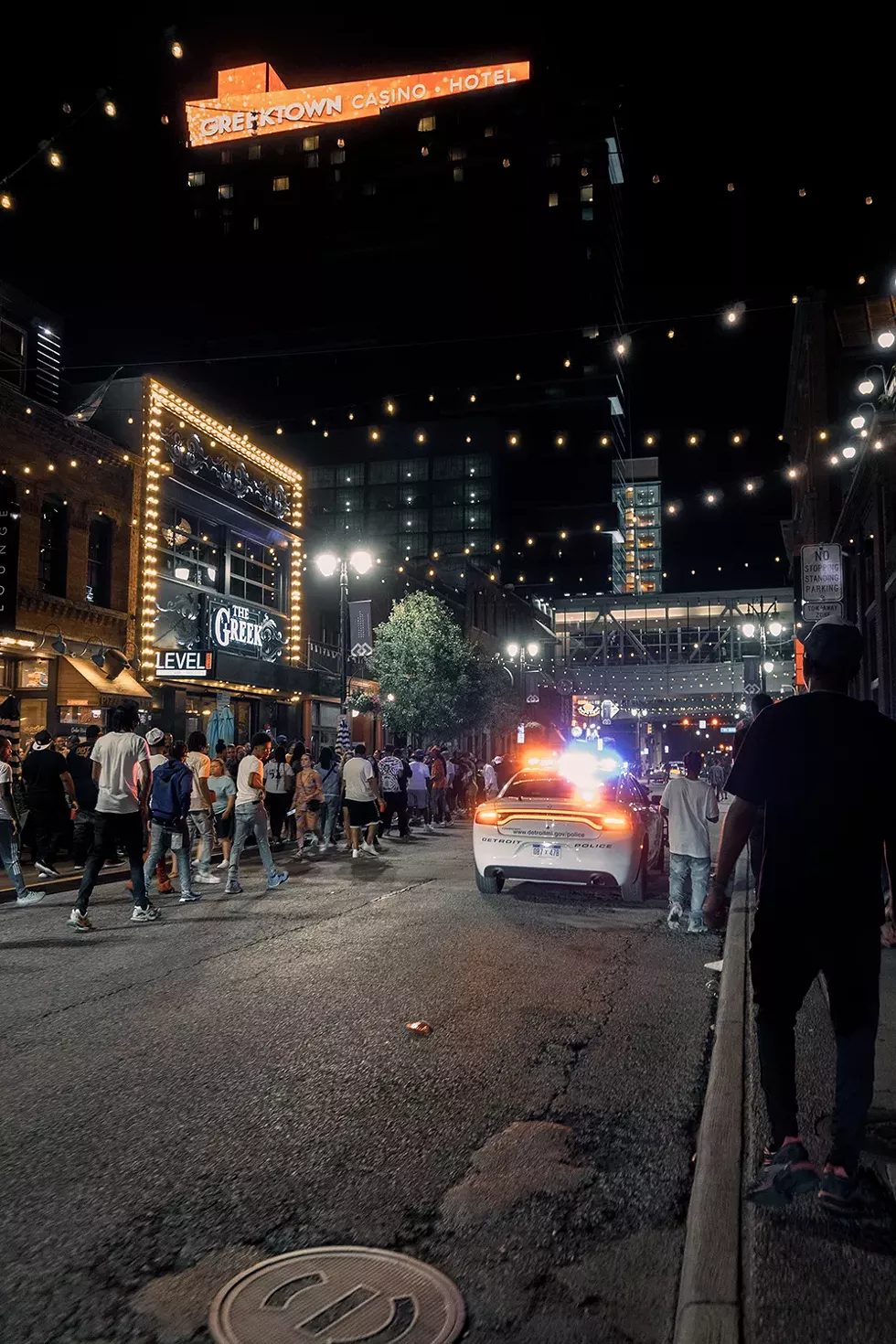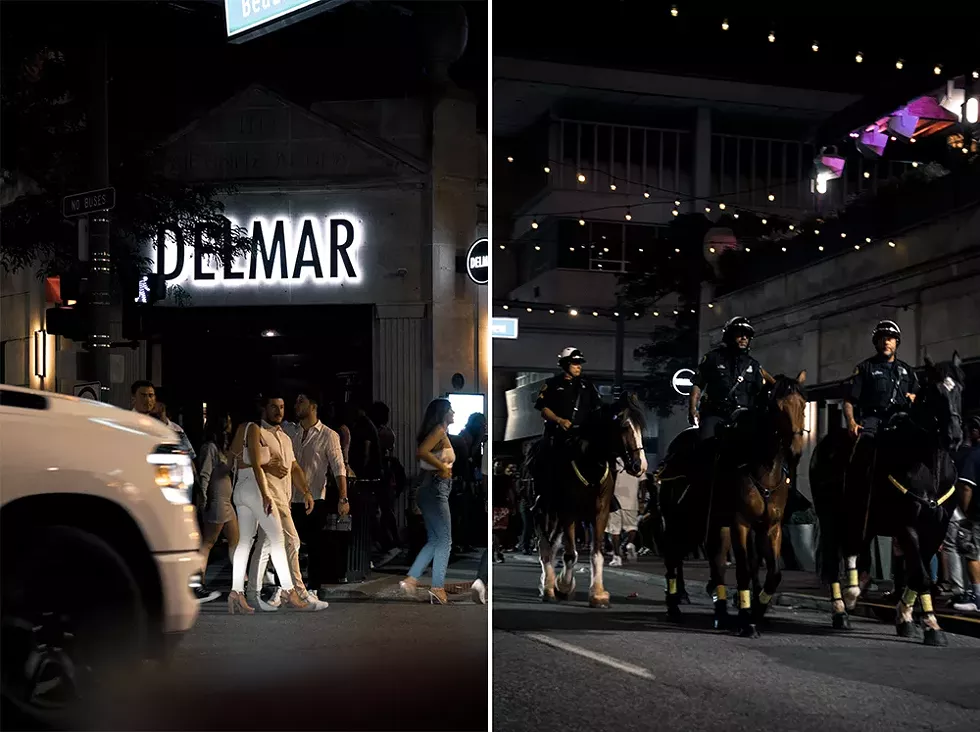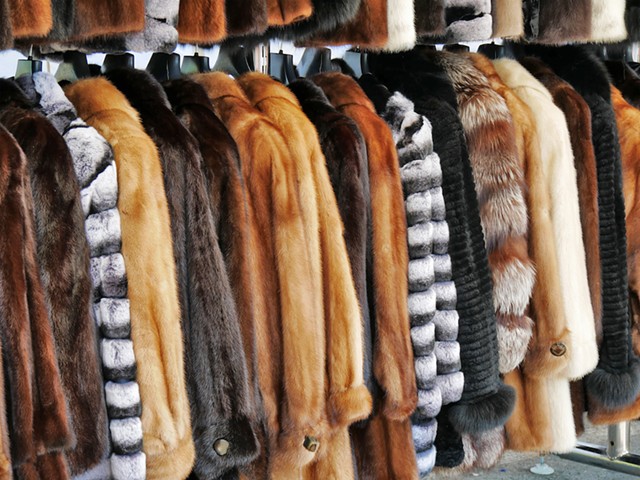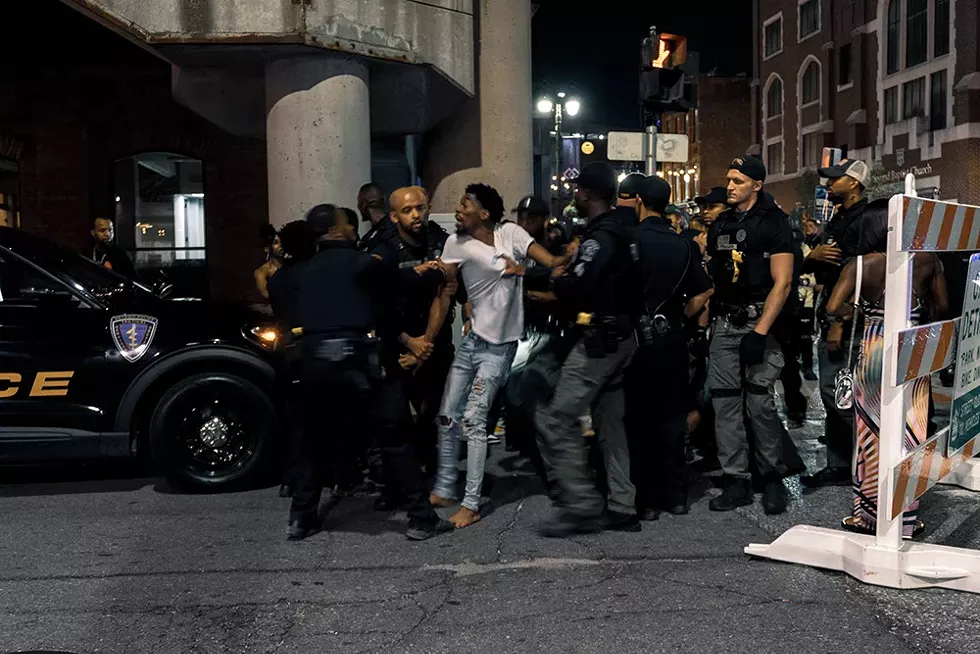
The story often goes like this: As the summer months encroach in Detroit, as temperatures get hotter and the crowds downtown get larger, Greektown gets crazier.
In May, as Michigan began its slow climb down from new coronavirus highs in April, the phrase "I'm in Greektown area" became a short-lived local meme — a sort of euphemism for the revelry the neighborhood has become known for — after a post on Twitter went viral of a mother sharing a text-message conversation between her and her son, who had tracked her phone's location to a bar.
But as the crowds and temperatures grow, news of crime in Greektown rises like mercury in a thermometer.
In June, a shaky, low-res, vertical cellphone video was posted on Instagram and Facebook by the account @crimenewsinthed. In the video, DPD officers struggle to gain control over a fight at the intersection of Monroe and Beaubien streets.
The incident was sparked by two groups who had reportedly encountered one another on the street and began fighting before the scuffle turned toward intervening officers, resulting in multiple injuries and arrests, according to the police.
Labeled a "brawl" by several news outlets, it didn't take long for the video of the fight to go viral and splash its way across local headlines, eventually eliciting a response from city officials. Five days after the incident, Mayor Mike Duggan and interim police chief James White held a press conference where they unveiled a five-point-plan, along with a $382,000 initiative approving 4,000 hours of overtime for officers with the express purpose of "crowd control" in neighborhoods like Greektown.
Then, earlier this month, another viral video from Greektown showed a Detroit police officer punch a man in the face after a confrontation, sending him flying to the ground. The officer has been placed on leave while the department investigates. During a news conference, Chief White said he had "serious concerns" about what he saw in the video.
"We've come to expect our officers to de-escalate situations," he said. "I did not see de-escalation there. I did not see our training there."
Though city officials emphasized a growing "party atmosphere" caused by the lifting of pandemic restrictions, the pattern of high-profile crimes followed by increased policing was not a new phenomenon for Greektown.
In 2017, a similar video of an incident depicted what local media at the time described as a "mob" of young men beating two people on the street at Monroe and St. Antoine. It wasn't the only violent incident to grab attention that year. Weeks later, a shooting outside a party bus prompted police to beef up patrols in the neighborhood and led a group of Greektown business owners to join Detroit's then-budding Project Greenlight network — establishing the area as Detroit's first heavily surveilled "Greenlight Corridor."
Despite a surplus of cameras and constant monitoring, 2018 saw more violent incidents, including a nonfatal quadruple shooting and another beating outside the Bouzouki strip club that put a 30-year-old man in a coma.
Often, the question posed after these high-profile incidents is whether Detroit police are doing enough to curb violence in the city. On the other hand, many Detroiters complain the focus on policing downtown eats up police attention and resources, causing them to neglect Detroit neighborhoods, where violent crime is just as — if not more — prevalent.
"There are places in the city, particularly on the east side, where if you take a ride through there, especially at night, you'd realize there's a complete absence of law enforcement," Boston-Edison resident Kwame Yamoah told The Detroit News in April 2019. "On the other hand, if you go downtown, you'll see plenty of police officers. So the complaint about downtown receiving more police attention than the neighborhoods ... one can't dispute that."
James Craig, then-Detroit police chief and now a prospective Republican gubernatorial candidate, disputed these claims at the time, telling The Detroit News that other precincts were more heavily staffed than downtown.
Greektown is an entertainment district. It's a place to get a drink or get drunk. A place to eat food, people-watch, and, depending on your luck, maybe win or lose some money at a craps table or Wheel of Fortune-themed slot machine.
If you ask people on the street why they come, you'll get a variety of answers: from dinner dates to just checking out the scene.
"It's the place to be," one partier tells Metro Times a few weeks after the brawl. "There's always something going down in Greektown."
It might seem inevitable that anywhere there are large concentrations of people drinking, gambling, and partying, there's bound to be bouts of violence that occur — and certainly, Greektown has seen more than its share over the years.
But in the aftermath of 2020 — the grave social and wealth inequalities the pandemic produced and exposed, and the unrest sparked by Black Lives Matter protests against police violence and systemic racism — the dynamic of crime and the way media and city officials respond to it has been called into question by abolitionist activists and historians who say Detroit has inadvertently trapped itself in a "self-fulfilling cycle," one that never actually attempts to address the root causes of urban violence.
To them, the story of Greektown is intricately tied to the story of Detroit — and all the ways it's changed over the last century, and all the ways it hasn't, where dreams of urban renewal and revitalization collide with the waking reality of segregation, gentrification, and economic inequality in one of America's Blackest cities.
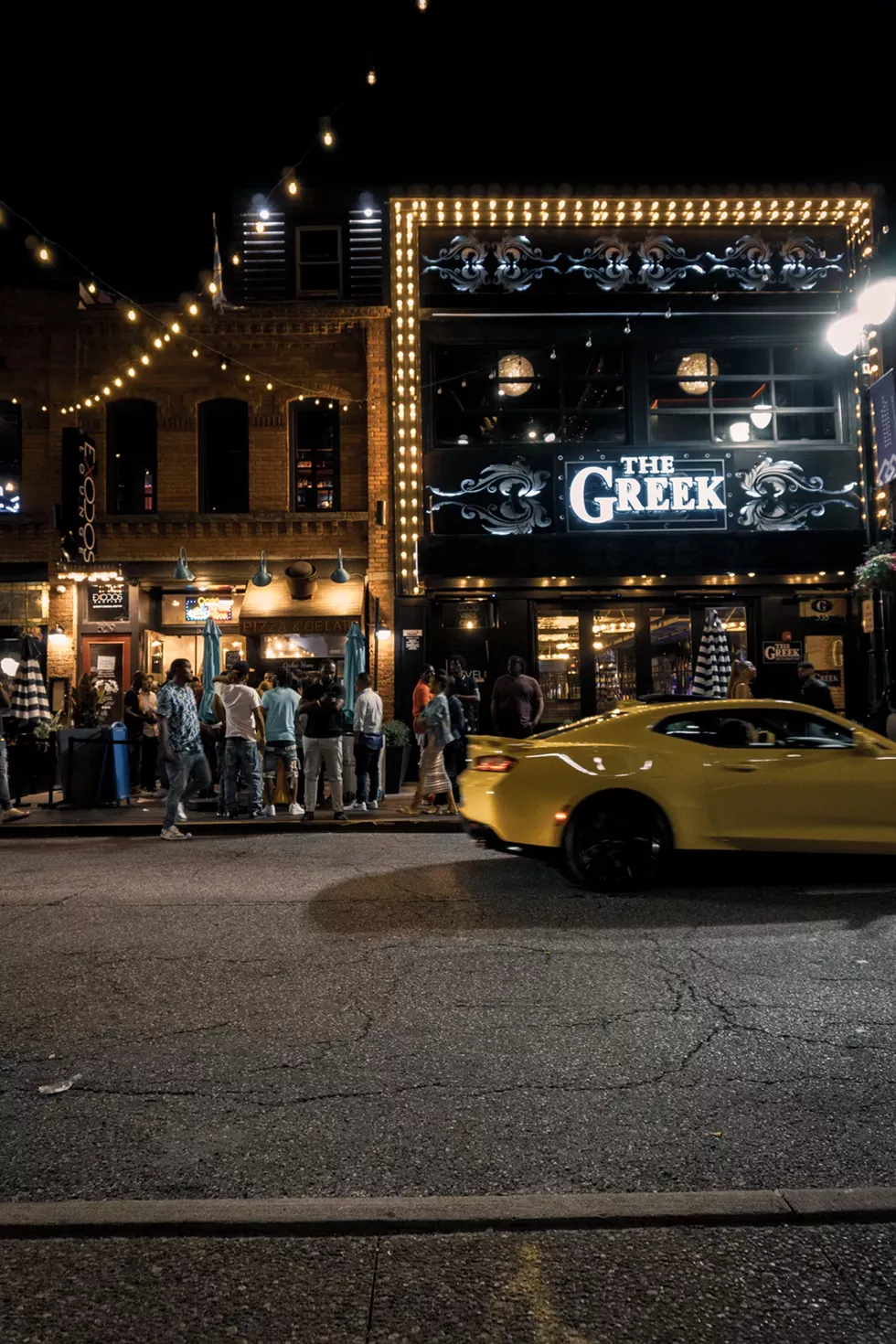
A changing neighborhood in a changing city
Greektown wasn't always the party scene it is today.A nationally registered historic district at the eastern edge of downtown, the entirety of Greektown covers a block of commercial buildings between Gratiot and Lafayette. The neighborhood's name and cultural identity date back to the late 19th century, when newly arrived Greek immigrants to Detroit settled into the area, replacing what had once been a largely German immigrant enclave.
By the 1920s, Greektown had largely transformed from a residential immigrant ghetto to a commercial district. Many of its Greek residents had moved out by then, but Greek proprietors still owned and maintained a range of boutique businesses in the neighborhood, leaving a mix of Greek, Polish, Italian, Lebanese, Mexican, and Black residents to occupy what little residential space was available.
Decades later, in the 1960s, Greektown was reduced to a single block after several buildings were razed to make way for downtown parking and institutional buildings along the city's newly constructed I-75 and I-375 freeways.
Under the banner of "Urban Renewal," Detroit's freeway projects of the '50s and '60s reshaped its downtown landscape. The largely Black neighborhoods surrounding Greektown, like Black Bottom and Paradise Valley, were wiped from the map to make way for the new road system — intentionally displacing tens of thousands of the neighborhood's Black residents.
Paradise Valley had been a premier entertainment district downtown up to that point. Home to Black-owned nightclubs and venues, the area was known as both an economic and cultural center for Detroit's growing Black community in the 20th century. Paradise Valley clubs hosted many legendary jazz artists that attracted Black and white audiences alike. But after the events of the 1943 riots, as racial tensions rose in the city, mixed audiences became less common. Areas like Black Bottom, long-neglected by property owners who mostly resided outside the city, were labeled slums, and became the prime target of bulldozers during the push for urban renewal.
In the absence of Paradise Valley, Greektown would emerge as one of downtown Detroit's most revered dining and tourist destinations. This was helped along in 1965, when Greek business owners sought to preserve the area's cultural identity by holding the first of many Greek festivals there, a celebration that eventually outgrew the area and moved to Hart Plaza.
Two years later, the uprisings of 1967 would intensify demographic trends that Detroit's freeways and growing racial tension had already ignited, plunging Detroit into an era of white flight, disinvestment, population decline, deindustrialization, and financial instability.
Though Greektown's reputation as the go-to scene downtown was continuing to grow by the early '80s, not everyone was happy with the neighborhood's changing character. Once known for its quaint Greek cafes, Greektown was becoming more commercialized as the financially ailing city and its administrators tried to find new ways to bring people and money back downtown.
"The businessmen took over, that's what it is," John Proventgas (described as a curly-haired Greek from the island of Chios) told the Detroit Free Press in 1981. "You see all the restaurants up there (on Monroe)? There's a lot of money there. You can make a lot of money in Greektown now."
Around this time, new attractions like arcades, and a shopping center in the renovated Trappers Alley complex, began bringing younger — often rowdier — crowds to the neighborhood.
"Anti-Arcaders complain that youths use up their money on video games then roam the streets, dance on sidewalks to beats from blaring radios, nurse dizzy heads while sitting on curbs or intimidate suburban couples strolling by on dinner dates," the Free Press wrote in 1983.
"The concern here is real," Jim Pappas, owner of the Pegasus Taverna, told the Free Press in a 1982 article, when asked about the arcades. "All it takes is three or four bad incidents and the press picks it up and people (will be) afraid to go to Greektown."
A casino comes to Greektown
Dimitrios "Jim" Pappas and his business partner Ted Gatzaros would become two of Greektown's major developers over the coming decades, helping to influence both the transformation of Greektown and Detroit as a whole.Starting as owners of a painting and construction contracting business, the two Greek immigrants who came to Detroit as teenagers in the '60s became co-owners of the Odyssey restaurant in Cadillac Tower before selling it and opening up the popular Greektown eatery Pegasus Taverna in the early '80s.
The duo were vocal opponents against Greektown's growing arcade culture, joining with the Greektown Merchants Association to lobby then-Detroit Mayor Coleman Young to "replace the video parlors with businesses more harmonious to the character of the area." Mayor Young took up Greektown's cause, issuing an 11 p.m. curfew on the weekends for kids under the age of 18, a policy the ACLU took issue with.
By the '90s, Pappas and Gatzaros would increase their holdings across Greektown and greater Detroit, with development projects that included Trappers Alley, the International Marketplace, Fishbone Rhythm Kitchen Café, 400 Monroe Associates (investment partnerships), and the Atheneum Hotel, among others both in and outside the city.
The duo had reputations as "risk takers," raising money for development projects downtown that others wouldn't touch. The projects helped the partners gain a foothold in Detroit politics. The two would also foster cozy, often scrutinized relationships with the Young, Archer, and Kilpatrick administrations.
But around 1988, Pappas and Gatzaros began to change their attitudes toward gaming in Greektown. Arcades were no longer the concern, however. Gaming — more specifically, games of chance — would save the city, they believed. Pappas and Gatzaros would become instrumental in the push to bring casinos to Detroit.
Introducing casinos to the city was a contentious idea that had been around for a while. Between the late '70s and the mid-'90s, five different ballot initiatives would be defeated by voters, preventing Detroit from opening casinos.
Proponents like Gatzaros and Pappas touted the potential of casinos to bring thousands of jobs to a city where unemployment was rampant, while opponents feared the casinos would fail to live up to those promises and would lead to more "compulsive behavior and crime." While there are many studies that link casinos to increased instances of crime, substance abuse, mental illness, and suicide, the extent and nature of the correlation is still debated.
In November 1993, as part of a publicity stunt to influence then-Governor John Engler to throw his support behind a proposal for Detroit casinos that wouldn't require voter approval, Gatzaros put out a fake ad for 10,000 casino jobs, attracting hundreds of unemployed Detroiters to wait in line for hours, all for jobs that didn't yet exist.
"Since 1980, Detroit has lost more than 105,000 jobs — 21 percent of the city's job base," Gatzaros wrote in response to an opinion column opposed to the casinos in the Free Press. "The Phoenix proposal will not require one penny of tax incentives for employment stimulus. What does that leave Detroit? Hope. A future. A chance. The ability to become a community again."
Many people were offended by Gatzaros's ploy, as well as what they perceived as the "undemocratic" method by which he wanted to achieve his ends.
"As an American of Greek descent I protest the shenanigans of Ted Gatzaros and Jim Pappas, who came into Greektown and proceeded to oversee its destruction," wrote Harold Gottleib, a Birmingham resident. "Now they have the bright idea of casino gambling, which has been voted down four times by the citizens of Detroit. Gatzaros and Pappas are greedy opportunists."
Pappas, Gatzaros, and other proponents would pour thousands of dollars into pro-casino election efforts over the next several years, until finally in 1996, a ballot initiative to legalize casinos in Detroit (Proposal E) passed by a narrow margin of 51 to 48 percent.
Greektown Casino would be the last of the three Detroit casinos to open its doors to the public, and the last to complete a permanent facility and hotel. Greektown Casino would change hands several times over the next decade. In the aftermath of the 2008 recession and after the casino filed for Chapter 11 Bankruptcy, the Sault Ste. Marie Tribe would turn over their majority stake in the casino to Greektown Superholdings Inc. and Greektown Newco Sub Inc. In 2013, Dan Gilbert's Rock Gaming venture bought a majority stake in Greektown Casino as part of his vision for downtown, which he called "Detroit 2.0." Rock Gaming would later sell its majority share to Vici Properties and Penn National Gaming in 2019.
Whether the casinos actually fulfilled the promises that they would bring jobs and revitalize the city would probably depend on who you ask. The revenue they brought certainly wasn't enough to prevent Detroit from becoming the largest American city to file for bankruptcy in 2013, though it did make clear just how much the city depended on casinos as a source of revenue. The three casino properties brought in as much as $170 million in taxes as the city was struggling to piece itself back together during the worst of its financial crises. And during their forced shutdown because of the pandemic in 2020, it was estimated that Detroit was losing as much as $600,000 a day, or 16 percent of the city's general fund revenue.
Past opponents of bringing casinos to Detroit feared they would bring more crime and that residents would succumb to gambling and other addictions if they were allowed to open. But in the end, it seems it was the city itself that had become the addict.
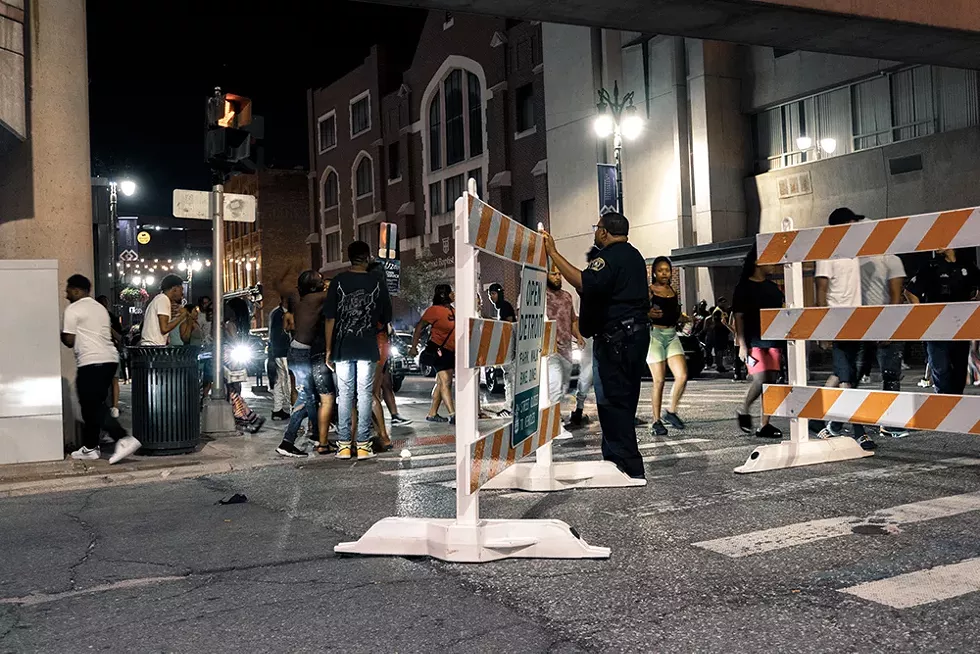
Big plans, bigger pandemic
Under new plans for development, Greektown hopes to shed the perception of a "single-use entertainment district," according to Melanie Markowicz, executive director of the Greektown Neighborhood Partnership."We're always going to be a center point of cultural entertainment for the city of Detroit and beyond, and that's certainly not changing," Markowicz says. "But part of our framework really [homes] in on diversifying use, so it's a family-friendly, mixed-use district."
Currently, no one actually lives in Greektown, as there's no residential space — though, that's set to change in the future with the construction of The Exchange, a 16-story residential building that recently broke ground. Perhaps the biggest challenge ahead for development is the fact that nearly 50 percent of Greektown's total surface area is allocated to parking, according to the Greektown Neighborhood Framework Vision released in September 2019.
The Framework Vision cited the abundance of parking lots and the lack of any residential space as one of the reasons Greektown isn't perceived as a more "family-friendly" experience.
"Areas with substantial surface parking areas and small, underutilized streets and public spaces can become hot-spots for undesirable behavior and can feel unsafe for nearby residents, workers, and visitors," the Greektown Neighborhood Framework Vision states.
Markowicz says parts of the Framework Vision plans are already underway, while other parts rely on how, when, and if the city develops adjoining areas, citing plans to convert I-375 into a more pedestrian-friendly surface boulevard, and plans to redevelop the Wayne County "fail jail" site, as part major steps toward the Framework's vision for the area. However, recent plans to build the Detroit Center for Innovation at the "fail jail" site recently fell through.
On top of these are some new challenges.
Greektown, like the rest of Michigan's restaurant and entertainment industry, took a major hit as pandemic restrictions forced businesses to temporarily shut their doors to customers in 2020. And Greektown was cited by Detroit public health officials as a "hotspot" for the city's rising coronavirus infection numbers in the summer of 2020.
The district was able to survive some of the economic devastation caused by the pandemic, thanks in part to recent aid from the federal government. Among the fewer than 40 percent of Michigan restaurants that applied for and received grants from the Restaurant Revitalization Fund set up during the pandemic, Greektown establishments made up some of the program's biggest recipients: The Old Shillelagh LLC received $1.96 million; Pegasus Greektown, operators of Pegasus Taverna, received $3.3 million; and the International Marketplace Inc., operators of Fishbones Rhythm Kitchen Café, received $8.6 million.
The Restaurant Revitalization fund was created as part of the American Rescue Plan Act passed by Congress in February during the Biden Administration, adding an additional $1.9 trillion to the $3.4 trillion spent during the CARES Act passed under the Trump administration. Whether the additional spending will be enough to combat the economic and social devastation brought on by the pandemic remains to be seen, but for many Black Detroiters it couldn't come soon enough.
In terms of rates of infections, deaths, and economic impact, Black Detroiters were disproportionately affected by the pandemic.
"In Detroit, Black people represent over 75 percent of known COVID-19 diagnoses by race and nearly 90 percent of deaths," a Brookings Institute study found. "Our analysis indicates the toll that systemic racism has had on Black residents of Detroit. Because of the legacies of underinvestment, redlining, jobs without benefits, poor or nonexistent and culturally incompetent health care, Black residents are less likely to be able to transcend the challenges presented by COVID-19 and are more likely to contract and die from the virus."
An analysis by The Washington Post last year showed that more than half of the money issued by the CARES Act went to the already wealthy and businesses, with only one-fifth of it going to individual relief.
While the unequal distribution of pandemic funds is not the fault of any individual proprietor or developer, it does provide another glaring example of how federal, state, and county authorities (whether intentionally or inadvertently) prioritize businesses over individual material needs, according to David Helps, a historian and fellow with the University of Michigan's Carceral State Project.
"I think it's worth emphasizing that Greektown, and really greater downtown, has been designed in the last few decades — going back to Coleman Young, but especially under Mike Duggan — designed to attract upper middle class and wealthy consumers and tourists from the suburbs and from outside of Michigan," says Helps.
PG Watkins, a community organizer, abolitionist activist, and director of the Black Bottom Archives, sees parallels between pandemic inequality and inequalities exacerbated by the urban renewal projects of the '40s, '50s, and '60s that effectively erased communities like Black Bottom and Paradise Valley.
For Watkins, the same dynamics of systemic racism and white supremacy are at play in how the city chooses to manage resources and how it chooses to police and surveil certain Detroit neighborhoods.
"I think particularly in downtown, we're seeing this influx of investment dollars, we're seeing this influx of big-name corporations wanting to have a presence down there, and in order for that to happen successfully for them, they need it to look a certain way and they need it to feel a certain way — they need a certain type of crowd or energy to not be present there," Watkins says. "Which includes these young Black folks that continue to be criminalized and punished by being down there. At the end of the day, it isn't the police that will make us safer."
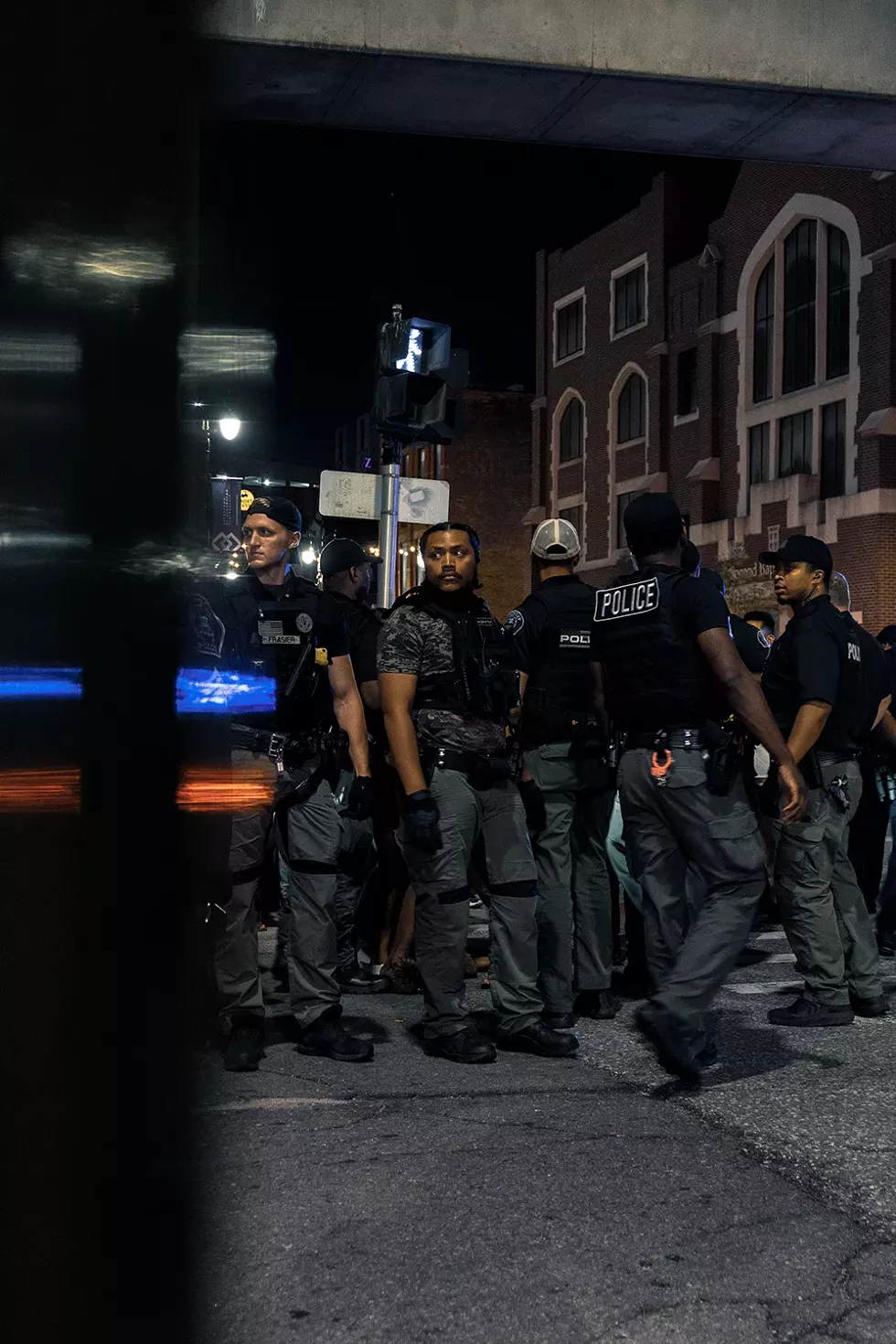
The debate around policing
Pastor Maurice "Mo" Hardwick of the Live in Peace Movement believes police generally do their best to protect people, even if they aren't always the best arbitrators and sometimes escalate situations."You got some police that just don't know how to talk to people," Hardwick says. "They might be tired or working overtime and then when they deal with drunk people or whatever and in that moment they take a bad attitude toward him or her and things escalate. And the same thing happens with citizens — they might be in a bad mood or not want to pour a drink [out] or put their marijuana out or just want to be disrespectful."
Hardwick, who started the Live in Peace Movement in Detroit, was in Greektown the same day Interim Chief White made a stop there after announcing the five-point-plan. Hardwick says he went to intervene in any potential confrontations, whether between groups of citizens, or between citizens and police.
While he was patrolling the strip, he says two men carrying open containers of alcohol were stopped by police. The officers told the men to pour out their alcohol, and the two men began to argue with them, but Hardwick says he and some friends got between the men and the officers before things could escalate.
"I was able to take them off to the side and talk with them and show them the error of their ways," Hardwick tells Metro Times. Adding that he believed the men were receptive to him because they knew him from "the neighborhood."
Hardwick and the Live in Peace Movement view themselves as violence interrupters: an approach to conflict intervention that utilizes de-escalation techniques to mediate potentially violent altercations.
Hardwick believes tensions between police and the community are high right now in Detroit, and that it's apparent in places like Greektown, where people go to party and "let loose." In his view, the pandemic and Black Lives Matter protests last summer made tensions between communities and police worse. He says he doesn't agree with protest demands like "defund the police."
"You need the police," he says. "They ain't there to get you because of race or the way you're dressed — they're there to police your behavior."
Markowicz says she believes violence and crime are problems in Greektown, only insofar as violence and crime in Detroit is a problem. The Greektown Neighborhood Partnership wants to work with police to ensure that visitors will be able to enjoy their experience while also feeling safe, according to Markowicz.
Christina Hapipas, owner of The Greek restaurant and member of the Greektown Merchants Association, says she believes violent incidents will have long-term effects on business there if more isn't done.
"My family has been here for 32 years," she says. "I don't want to watch my livelihood go down the tubes because you have some thugs that decided that Greektown is the block party for every weekend."
Hapipas says the majority of people who come to Greektown aren't looking to cause trouble and that most problems are caused by people loitering on the streets. She wonders if they should restrict access to Greektown at a certain time, making it accessible only to people 21 and older or even implementing a dress code. "I think that we really need to come up with creative ideas as to what we can do as a district to bring in the crowd that we want to come down here," she says.
She also believes that social media has helped exacerbate the issue.
"I think social media has done a fabulous job to invite troublemakers to the district on the weekends," Hapipas says. "I think people thrive on this. I think they see what's going down and want to be a part of it. If you go to [@crimesintheD], you see people [in the comments] saying they can't wait for Saturday night to come check out the action in the streets of Greektown. It's become the thing to do."
She adds, "[The police are] losing their authority because they're afraid."
Like Hardwick, Hapipas says police are trying their best, but says officers she's talked to feel constrained by criticisms and the potential for instances to be recorded and taken out of context.
"They're in a bad position themselves because they're afraid to do their job." Hapipas says. "They [the police] say it at every meeting we have. They say, 'Sure we can make arrests, but you know what the consequences are going to be; it's going to be someone pulling out their cameras. They're going to provoke us to maybe do something that we don't want to do. Even if that's pushing us or whatever. It turns into a gang fight against the police officer, and things get recorded and it looks horrible.'"
Though violent crime stats for nonfatal shootings and homicides did rise in Detroit and other major cities in 2020, it's unclear whether those stats have increased or decreased this year. The Detroit police issue a yearly summary of crime statistics but say they don't have data compiled for this year yet, and do not collect data specific to areas like Greektown, according to a DPD spokesperson.
Regardless, concerns about increasing crime have re-emerged as a hot-button political topic in recent weeks.
A recent poll of 500 Detroit residents found that 77% would sign on to the statement "Detroit police generally do a good job and treat people of different races fairly, even if there are a few bad apples on the force." Though, as anti-police-brutality organizations like Detroit Will Breathe were quick to point out on social media, aside from issues of methodology and sampling, the poll also showed that the majority of those polled (58%) gave Detroit police a "fair" to "poor" rating.
The same poll also found that a majority of Black men they polled attributed recent spikes in shootings and homicides to the "availability of guns" and a "lack of jobs/unemployment," while the majority of Black women who participated attributed it to the pandemic and unemployment.
Helps and Watkins have very different takes on the situation than Hardwick or the Greektown Neighborhood Partnership.
"I think there is a cycle (in Greektown) that comes from the false narrative that policing prevents crime," Watkins says. "Police are there to respond to crime. We know that enforcement strategies and surveillance don't do anything except hand out more tickets and incarcerate people."
Helps echoes those sentiments.
"When you go back through the history, you see lots of moments in Detroit where these kinds of isolated, sometimes exaggerated, instances of violence are used by politicians and other officials to create this sense that something novel is going on," Helps says. "I mean, there might be contributing factors like pandemic restrictions loosening, but every year there are stabbings and shootings associated with casinos and bars in Greektown."
Helps adds that while he thinks violence is always a legitimate concern, especially for Detroit residents who are affected by it, he feels there is often important context that is left out from conversations around issues of violence.
"We talk about statistics like how many guns were recovered or how many people were involved in this or that type of brawl, but tend to overlook that opportunities for young people — and young Black people in Detroit, especially — are all too often non-existent or hard to attain," Helps says. "I think now, more than in recent years, there is a recognition that violence and harm can't be separated from the structural problems that people are facing."
Watkins believes that there are things planners and urban designers can do to help the area. The inclusion of more public, non-privatized spaces is one of them, though they caution that public spaces alone would only go so far in mitigating or preventing violence.
"I don't think the solution is just to design your way out of these issues, but I do think there are interesting ways that we can think about urban design that could support us moving away from criminalizing and moving towards a more humanized way of relating to and being in physical space together," Watkins says. "Privatization has kind of pieced out all of the space. And so there is not, there's not public space, there's not ample opportunities for folks to create fellowship with each other. I think that's a design flaw."
Dispatches from the district
When Metro Times visits Greektown a week after White and Duggan announce their five-point-plan, the large increase in police presence in the area is impossible to ignore. DPD takes up positions at every street corner, and every hint that there might be trouble is greeted by dozens of officers who step in to intervene. Regardless, the neighborhood is still full of people out enjoying the night.At times, it feels like there's an unspoken "stop and frisk" policy at work — something that feels more like intimidation than enforcement. We see several young Black men stopped by groups of patrolling officers and asked questions, seemingly for no reason other than the officers' gut suspicions. One man who's stopped stands there and answers questions as his friend walks away shouting about how the police have no right to stop him. Still, many people we ask don't mind the throngs of police and say they're happy the cops are here to "keep people in line."
"We're just out here to make sure people have fun and stay safe," says one Black officer who doesn't want to be named.
As we stop to watch people along Monroe in front of The Greek, we strike up a conversation with a young kid who introduces himself as Michael. Michael, who is Black, is visiting Greektown with his family, happily eating an ice-cream cone from Cold Stone Creamery. In front of us stands a row of four officers on horseback. A group of mostly young white women in neon wigs — likely a bachelorette party — gathers in front of them to pet the horses.
"I want to be a policeman one day," Michael says.
As Michael begins to talk about his favorite Sonic the Hedgehog video game, some yelling breaks out on the street in front of us; a white cop on horseback barrels over a young Black man on the street. The horse hovers so closely over the top of the man that we're afraid he might accidently trample him.
"Don't touch the horse!" the officer angrily shouts.
Apparently, "the dude was petting the horse too hard or something," one bystander tells us.
As we begin to walk away, we gaze up above the top of the two-story commercial buildings along Monroe and can't help but notice how the Old Wayne County Jail — a large monolith-looking building in the design of brutalist architecture from a bygone era and a site infamous for its inhumane conditions — hangs above the entire strip, as if it were looking down and watching people on the street. Never mind the blinking green lights.
Whether it's past or future plans for urban renewal, revitalization, or snappy buzzwords like "Detroit 2.0," the fate of Detroit, downtown, and Greektown is constantly in flux, spurred with what are perhaps well-intentioned but often grandiose ideas for development and change. But who benefits and who is invited to be a part of these changes — White or Black, rich or poor, developers or marginalized communities — is the real question.
Though Pastor Mo doesn't agree with slogans or ideas like "Defund the Police," when we ask him what he thinks is really at the heart of violence in Detroit or Greektown, he doesn't actually sound that different from activists or protesters.
"Detroit's got to stop chasing fires, bro," he says as his voice grows more anguished, almost angry. "We can't be fire chasers. We can't keep running to the issues and then when the issue is done pretend like it goes away till the next fire. We got to deal with it. You can't just deal with it with policing because the issues are way systemic.
"They go way deeper than just a child or young man with bad behavior, when you left them with no funding for school, with no food on the table — that's your robber, that's your shooter, that's your guy fighting with police. Act like you wonder why these kids roll up with 20 guys in white T-shirts and five cars and big-ass guns — it's because that's real power to them. Real power because you left them with nothing else!"
He pauses and takes a deep breath.
"You better put that in the paper."
Stay connected with Detroit Metro Times. Subscribe to our newsletters, and follow us on Google News, Apple News, Twitter, Facebook, Instagram, or Reddit.

